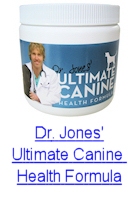|
Hi Friend,
Greetings to you and your pets this Tuesday.
Vaccines are a complex, and heated topic, so I thought I'd spend some time revieving the AAHA Updated Canine Vaccine Guideline Report.
It contains specific details on side effects, or what they call 'Adverse Events'
Before I get to far into the story, I want to encourage you to have a look at some of the key immune supportive ingredients in Ultimate Canine Health Formula.
Bovine colostrum
Inositol hexaphosphate
Aloe vera (200:1 extract)
Maiitake (4:1 extract)
Fructooligosaccharides
Lactobacillus acidophilus (150 million CFU)
Bifidobacterium bifidum (150 million CFU)
Flaxseed oil (Omega Fatty Acids 3,6,9)
l-lysine
Here's where to grab your 50% OFF trial bottle:
http://www.thedogsupplement.com
-------------------------------
Vaccine Adverse Events
------------------------------
They make the statement that:
'Vaccine AEs (Adverse Events) are underreported in veterinary medicine.'
Meaning there are far more side effects than what is 'published' as they are NOT reported.
Here is some of what they have to say about side effects
Vaccines are biologic products and, as such, provoke a series of
complex immune reactions that may culminate in rapid-onset side
effects lasting from a few hours to a few days. Rarely do these selflimiting side effects escalate into serious AEs (SAEs).
For this reason, veterinarians are encouraged to inform clientele that their pet, regardless of breed or size, may manifest transient side effects for up to 2, and possibly 3, days after administration of any vaccine or any combination of vaccines.
Side effects commonly observed include:
reduced or loss of appetite (lasting for one or two feedings),
pain at the injection site, lethargy (lack of activity), reluctance to walk and/or run, and mild fever.
Treatment is usually not indicated; however, some veterinarians have reported administering short-term symptomatic treatment (e.g., a nonsteroidal anti-inflammatory drug [NSAIDs]).
It is recommended that clientele be advised to contact the practice in the event any physical and/or behavioral manifestations progressively worsen or continue beyond 2–3 days. Clientele should be advised to contact the practice at any time if signs of systemic illness, such as vomiting, diarrhea, seizures, facial swelling, collapse, or difficulty breathing, develop.
------------------------
Serious Side Effects
------------------------
Injection-site reactions: lumps (abscess, granuloma, seroma),
pain, swelling, hair loss associated with ischemic vasculitis
Transient postvaccinal nonspecific illness: lethargy, anorexia,
fever, regional lymphadenomegaly, soreness, abortion, encephalitis,polyneuritis, arthritis, seizures, behavioral changes, hairloss or color change at the injection site, respiratory disease
Allergic (hypersensitivity) and immune-mediated reactions:
–Type 1 (acute anaphylaxis): angioedema (especially the head),
anaphylaxis (shock), and death
–Type 2 (cytolytic): immune-mediated hemolytic anemia,
immune-mediated thrombocytopenia (suspected only; causality
has not been confirmed)
–Type 3 (immune-complex): cutaneous ischemic vasculopathy
associated with rabies vaccine, corneal edema (‘blue-eye’) associated with CAV-1 vaccine, immune-mediated disease
Tumorigenesis: vaccine-associated sarcoma or other tumors
Multisystemic infectious/inflammatory disorder of young
Weimaraner dogs: may be genetically linked to both a poorly
characterized immunodeficiency and to autoimmune disorders
(e.g., hypothyroidism and hypertrophic osteodystrophy [HOD]
that are detected shortly after vaccination
Vaccine-induced immunosuppression: associated with first or
second dose of combination MLV vaccines containing CDVand
CAV-1 or CAV-2 with or without other vaccines (e.g., CPV-2,
CPI). Immunosuppression begins 3 days after vaccination and
persists for 7–10 days. The suppression may be associated with
increased susceptibility to other diseases.
Reactions caused by the incorrect or inappropriate administration
of vaccine: fatalities have been reported after subcutaneous
administration of an avirulent-live Bb bacterin (intended
for IN administration); inadvertent or intentional administration
of vaccine by the intravenous route
Reactions associated with residual virulence attenuated vaccine:
postvaccinal sneezing associated with IN administration of
attenuated vaccine (e.g., Bb 1 parainfluenza virus)
Vaccine-induced interference with diagnostic tests: falsepositive
polymerase chaine reaction (PCR) test results for parvovirus
antigen in feces in dogs recently receiving a MLV parvovirus
vaccine. Not an adverse reaction.
Reversion of vaccine virus to a virulent pathogen: generally
considered rare to nonexistent among currently licensed canine
vaccines when vaccines are used in the species for which they
were licensed. This can become a significant problem when
vaccine is used in the wild and/or exotic animals.
P.S. So just HOW common are vaccine reactions?
Good question, but as the side effects are under-reported, we just don't know. No question FAR more common than what the reps of Big Pharma would tell you.
Which means you've got to really weigh the pros and cons of the vaccine.
ONLY give what is necessary.
Give it as infrequent as possible.
If you have a small dog or cat, I would ask your veterinarian about vaccine volume. WHY is it that a 160lb Great Dane would get the SAME volume of vaccine as a 3lb Chihuahua?
Makes no sense to me.
But in the AAHA Guidelines they advise to give the SAME volume, regardless of weight.
More reasons for YOU to be especially cautious.
Ultimately the point of vaccines are to PREVENT disease.

There are MANY ways to do this.
Such as the use of neutraceuticals to boost and support your dog's immune system.
My supplement contains specific immune supportive ingredients.
And you can get it for 50% OFF here:
http://www.thedogsupplement.com
P.P.S. Do I still think vaccines are important?
Yes
But used appropiately, and with CAUTION
Discuss this with your Veterinarian.
Then make YOUR own decision
Heal Your Pets At Home!
Best Wishes,
Dr Andrew Jones

DISCLAIMER: This information is for educational purposes only and is not intended to replace the advice of your own veterinarian. Dr Andrew Jones resigned from the College of Veterinarians of B.C. effective December 1 2010, meaning he cannot answer specific questions about your pet's medical issues or make specific medical recommendations for your pet.
PRIVACY POLICY: We will never rent, sell, loan, provide, barter, exchange or in any way make available your personal information to others. You can unsubscribe or change your email address at any time using the links at the bottom of this email.
Copyright 2012 Four Paws Online Ltd.
Tel: 1-800-396-1534
Fax: 1-888-398-1378
www.theonlinevet.com
support@fourpawsonlineltd.com
|